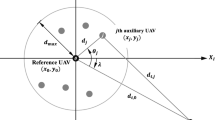Abstract
In this work, a method based on position predicting, velocity filtering and self adaptive parameter tunning is addressed for state estimation and control for swarm of mini unmanned aerial vehicles (UAVs), in order to deal with random noise and data dropout appeared during flights. Under conditions of random data dropout rates and communication latencies, the presented algorithm gives position prediction based on filtered velocity estimation and it fuses the prediction with sensor data. At the same time it corrects the prediction by the error between prediction and measurement of the previous step. The algorithm is designed for tracking mini UAVs with identical marker configuration, and the principles refered is in potential of serving to state estimation in various circumstances. Based on this localization algorithm, a cascade nonlinear control model is developed for swarm UAV control. This work contributes mainly to the object localization and control in a multi-agent system in which all the agents are considered to be in an identical form, hoping that this work will be the testbed for more complicated swarm robot control experiments. Comparison results of state estimation are presented by implementing experiments with or without data dropout.
H. Yu and W. Zhang—Equal contributors.
Access this chapter
Tax calculation will be finalised at checkout
Purchases are for personal use only
Similar content being viewed by others
References
Giles, K., Giammarco, K.: Mission-based Architecture for Swarm Composability (MASC). Procedia Comput. Sci. 114, 57–64 (2017)
Yatskin, D., Kalinov, I.: Principles of solving the space monitoring problem by multirotors swarm. In: International Conference on Engineering and Telecommunication (EnT), pp. 47–50 (2017)
Schneider, D.: Open season on drones? IEEE Spectr. 51(1), 32–33 (2014)
Tanzi, T., Apvrille, L., Dugelay, J.L., et al.: UAVs for humanitarian missions: autonomy and reliability. In: Global Humanitarian Technology Conference, pp. 271–278. IEEE (2014)
Loayza, K., Lucas, P., Pelaez, E.: A centralized control of movements using a collision avoidance algorithm for a swarm of autonomous agents. In: IEEE Second Ecuador Technical Chapters Meeting, pp. 1–6. IEEE (2017)
Albani, D., Nardi, D., Trianni, V.: Field coverage and weed mapping by UAV swarms. IEEE/RSJ International Conference on Intelligent Robots and Systems, pp. 4319–4325. IEEE (2017)
Arpino, G., Morris, K., Nagavalli, S., Sycara, K.: Using information invariants to compare swarm algorithms and general multi-robot algorithms: a technical report. In: IEEE International Conference on Robotics and Automation (2018)
Wan, S., Lu, J., Fan, P.: Semi-centralized control for multi robot formation. In: International Conference on Robotics and Automation Engineering (ICRAE), pp. 31–36 (2017)
Xuan, P., Lesser, V.: Multi-agent policies: from centralized ones to decentralized ones. In: International Joint Conference on Autonomous Agents and Multiagent Systems, pp. 1098–1105. ACM (2002)
Lupashin, S., Hehn, M., Mueller, M.W., Schoellig, A.P., Sherback, M., D’Andrea, R.: A platform for aerial robotics research and demonstration: the flying machine arena. Mechatronics 24(1), 41–54 (2014)
Ledergerber, A., Hamer, M., D’Andrea, R.: A robot self-localization system using one-way ultra-wideband communication, Mechatronics, In: IEEE/RSJ International Conference on Intelligent Robots and Systems, pp. 3131–3137 (2015)
Preiss, J.A., Honig, W., Sukhatme, G.S., Ayanian, N.: Crazyswarm: a large nano-quadcopter swarm. In: IEEE International Conference on Robotics and Automation, pp. 3299–3304 (2017)
Mellinger, D., Kumar, V.: Minimum snap trajectory generation and control for quadrotors. In: IEEE International Conference on Robotics and Automation, pp. 2520–2525 (2011). https://doi.org/10.1109/ICRA.2011.5980409
Bitcraze. https://www.bitcraze.io/. Accessed 4 Oct 2017
Acknowledgement
This work was partially supported by the National Natural Science Foundation of China (Grant No. 51605282) and National Science and Technology Major Project.
Author information
Authors and Affiliations
Corresponding author
Editor information
Editors and Affiliations
Rights and permissions
Copyright information
© 2018 Springer Nature Switzerland AG
About this paper
Cite this paper
Yu, H., Zhang, W., Sheng, X., Dong, W. (2018). State Estimation for Swarm UAVs Under Data Dropout Condition. In: Chen, Z., Mendes, A., Yan, Y., Chen, S. (eds) Intelligent Robotics and Applications. ICIRA 2018. Lecture Notes in Computer Science(), vol 10984. Springer, Cham. https://doi.org/10.1007/978-3-319-97586-3_7
Download citation
DOI: https://doi.org/10.1007/978-3-319-97586-3_7
Published:
Publisher Name: Springer, Cham
Print ISBN: 978-3-319-97585-6
Online ISBN: 978-3-319-97586-3
eBook Packages: Computer ScienceComputer Science (R0)




